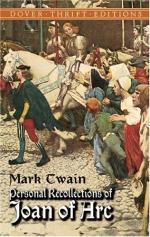He appealed to the Pope, and the Pope appointed a great commission of churchmen to examine into the facts of Joan’s life and award judgment. The Commission sat at Paris, at Domremy, at Rouen, at Orleans, and at several other places, and continued its work during several months. It examined the records of Joan’s trials, it examined the Bastard of Orleans, and the Duke d’Alencon, and D’Aulon, and Pasquerel, and Courcelles, and Isambard de la Pierre, and Manchon, and me, and many others whose names I have made familiar to you; also they examined more than a hundred witnesses whose names are less familiar to you—the friends of Joan in Domremy, Vaucouleurs, Orleans, and other places, and a number of judges and other people who had assisted at the Rouen trials, the abjuration, and the martyrdom. And out of this exhaustive examination Joan’s character and history came spotless and perfect, and this verdict was placed upon record, to remain forever.
I was present upon most of these occasions, and saw again many faces which I have not seen for a quarter of a century; among them some well-beloved faces—those of our generals and that of Catherine Boucher (married, alas!), and also among them certain other faces that filled me with bitterness—those of Beaupere and Courcelles and a number of their fellow-fiends. I saw Haumette and Little Mengette—edging along toward fifty now, and mothers of many children. I saw Noel’s father, and the parents of the Paladin and the Sunflower.
It was beautiful to hear the Duke d’Alencon praise Joan’s splendid capacities as a general, and to hear the Bastard indorse these praises with his eloquent tongue and then go on and tell how sweet and good Joan was, and how full of pluck and fire and impetuosity, and mischief, and mirthfulness, and tenderness, and compassion, and everything that was pure and fine and noble and lovely. He made her live again before me, and wrung my heart.
I have finished my story of Joan of Arc, that wonderful child, that sublime personality, that spirit which in one regard has had no peer and will have none—this: its purity from all alloy of self-seeking, self-interest, personal ambition. In it no trace of these motives can be found, search as you may, and this cannot be said of any other person whose name appears in profane history.
With Joan of Arc love of country was more than a sentiment—it was a passion. She was the Genius of Patriotism—she was Patriotism embodied, concreted, made flesh, and palpable to the touch and visible to the eye.
Love, Mercy, Charity, Fortitude, War, Peace, Poetry, Music—these may be symbolized as any shall prefer: by figures of either sex and of any age; but a slender girl in her first young bloom, with the martyr’s crown upon her head, and in her hand the sword that severed her country’s bonds—shall not this, and no other, stand for patriotism through all the



